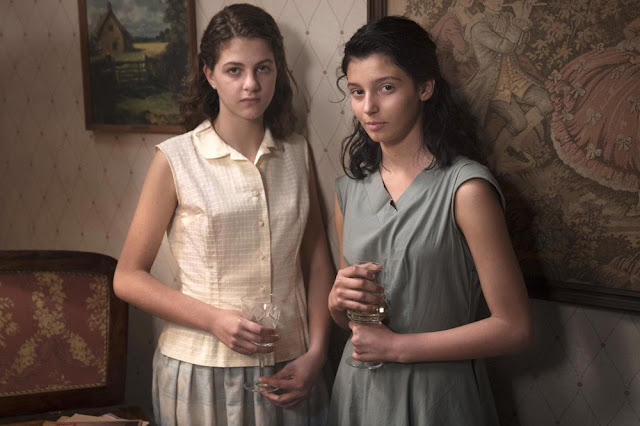Industry
(Español /English)
Cinco graduados universitarios pasan un periodo de prueba en
Pierpoint & Co, uno de los principales bancos de inversión de Londres, al cabo del
cual sólo uno o dos ellos ingresarán a su staff de manera permanente.
La miniserie no sólo echa una mirada a lo que ocurre dentro de
ese tipo de instituciones sino que se mete de lleno en la vida personal de
estos jóvenes ambiciosos.
En cuanto a Pierpoint, vemos a los personajes hablar todo el
tiempo de operaciones bursátiles y otras transacciones que técnicamente no
entendemos (y que no es necesario entender), salvo que se pierden o ganan fortunas
en operaciones instantáneas y de comprensión muy lejana del sentido común. Cada
uno de los “graduados” tiene un manager y están todos a su vez insertos en una madeja
de jerarquías gerenciales complejas y muchas veces en conflicto. Otro aspecto abordado
es la relación de los jefes y sus graduados con los clientes y sus cuentas. Si
bien exhibe una pátina de informalidad, obviamente el ambiente de trabajo es competitivo
y las presiones y el maltrato laboral abundan.
Los graduados son de orígenes y extracciones sociales
diversas y esto se aprecia en el otro gran apartado de la serie: sus vidas
personales. Si bien compiten laboralmente, forman un grupo social veinteañero y
millenial de relaciones cambiantes entre sí, donde abundan el sexo, las drogas y
la noche, retratados con franqueza y naturalidad y donde la amistad es una
posibilidad.
No soy afecto a las comparaciones, pero por la profundidad
con que aborda los vínculos personales y sociales, su relación con lo laboral y
la descripción del ambiente de trabajo, la serie recuerda a Mad Men, mientras
que la dureza de algunos de sus diálogos remite a Succession.
Industry es de esas series que no para de crecer en interés y complejidad dramática, a partir de personajes muy bien construidos e interpretados, ambiciosos pero inseguros, que configuran un drama coral que destaca a Harper Stern (Miha'la Herrold) como su protagonista, una chica estadounidense, acaso la más arribista, aplicada y capaz de los graduados. Se le suman Yasmin (Marisa Abela) la niña bella, rica y blanca que busca iniciarse “desde abajo” en la empresa y Robert, el muchacho bonito proveniente del interior de Inglaterra (Harry Lowly), entre otros. Y entre los jefes y managers se destacan Freya Mavor como Daria, Ken Leung como Eric y Derek Ridell como Clement, entre otros.
Industry es una serie tan elegante como profunda, cuya banda
sonora electrónica (inicialmente algo desconcertante) contribuye decisivamente
con sus climas y a definir su espíritu.
En definitiva, una serie sobre la construcción y el
ejercicio del poder y que pone en cuestión la meritocracia como vía de ascenso
laboral en el ambiente que describe.
...................................................................................................................................................................
English review
Five university graduates pass a probationary period at
Pierpoint & Co, one of London's leading investment banks, after which only one or
two of them will join its staff permanently.
The miniseries not only takes a look at what happens within
these types of institutions but also immerses itself fully in the personal
lives of these ambitious young people.
As for Pierpoint, we see the characters talking all the time
about stock trades and other transactions that we do not technically understand
(and do not need to understand), except that fortunes are lost or gained in
instantaneous trades and understanding very far from common sense. . Each of
the "graduates" has a manager and they are all in turn embedded in a
tangle of complex management hierarchies and often in conflict. Another aspect
addressed is the relationship of managers and their graduates with clients and
their accounts. Although it exhibits a patina of informality, the work
environment is obviously competitive and pressures and mistreatment abound.
The graduates are of diverse origins and social backgrounds
and this can be seen in the other great section of the series: their personal
lives. Although they compete for work, they form a twenty-something and
millennial social group of changing relationships with each other, where sex,
drugs and the night abound, portrayed with frankness and naturalness and where
friendship is a possibility.
I am not fond of comparisons, but due to the depth with
which it addresses personal and social ties, its relationship with work and the
description of the work environment, the series is reminiscent of Mad Men,
while the harshness of some of its dialogues refers to to Succession.
Industry is one of those series that does not stop growing
in interest and dramatic complexity, based on very well constructed and
interpreted characters, ambitious but insecure, that make up a choral drama
that highlights Harper Stern (Miha'la Herrold) as its protagonist, an American
girl, perhaps the most adventurous, diligent and capable of the graduates. She
is joined by Yasmin (Marisa Abela) the beautiful, rich and white girl who seeks
to start "from below" in the company and Robert, the pretty boy from
the interior of England (Harry Lowly), among others. And among the bosses and
managers, Freya Mavor as Daria, Ken Leung as Eric and Derek Ridell as Clement
stand out, among others.
Industry is a series as elegant as it is profound, whose
electronic soundtrack (initially somewhat disconcerting) contributes decisively
to its climates and to define its spirit.
In short, a series about the construction and exercise of
power and that calls into question meritocracy as a way of promoting employment
in the environment it describes.





Comentarios
Publicar un comentario
Mensajes sujetos a moderación